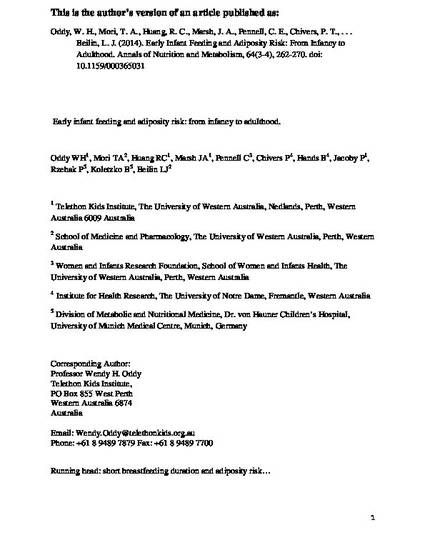
Introduction: Systematic reviews suggest that a longer duration of breast-feeding is associated with a reduction in the risk of later overweight and obesity. Most studies examining breast-feeding in relation to adiposity have not used longitudinal analysis. In our study, we aimed to examine early infant feeding and adiposity risk in a longitudinal cohort from birth to young adulthood using new as well as published data.
Methods: Data from the Western Australian Pregnancy Cohort (Raine) Study in Perth, W.A., Australia, were used to examine associations between breast-feeding and measures of adiposity at 1, 2, 3, 6, 8, 10, 14, 17, and 20 years.
Results: Breast-feeding was measured in a number of ways. Longer breast-feeding (in months) was associated with reductions in weight z-scores between birth and 1 year (β = -0.027; p < 0.001) in the adjusted analysis. At 3 years, breast-feeding for <4 months increased the odds of infants experiencing early rapid growth (OR 2.05; 95% CI 1.43-2.94; p < 0.001). From 1 to 8 years, children breast-fed for ≤4 months compared to ≥12 months had a significantly greater probability of exceeding the 95th percentile of weight. The age at which breast-feeding was stopped and a milk other than breast milk was introduced (introduction of formula milk) played a significant role in the trajectory of the BMI from birth to 14 years; the 4-month cutoff point was consistently associated with a higher BMI trajectory. Introduction of a milk other than breast milk before 6 months compared to at 6 months or later was a risk factor for being overweight or obese at 20 years of age (OR 1.47; 95% CI 1.12-1.93; p = 0.005).
Discussion: Breast-feeding until 6 months of age and beyond should be encouraged and is recommended for protection against increased adiposity in childhood, adolescence, and young adulthood. Adverse long-term effects of early growth acceleration are fundamental in later overweight and obesity. Formula feeding stimulates a higher postnatal growth velocity, whereas breast-feeding promotes slower growth and a reduced likelihood of overweight and obesity. Biological mechanisms underlying the protective effect of breast-feeding against obesity are based on the unique composition and metabolic and physiological responses to human milk.
- adiposity,
- breastfeeding,
- formula-feeding,
- obesity,
- Raine Study
Available at: http://works.bepress.com/beth-hands/3/
